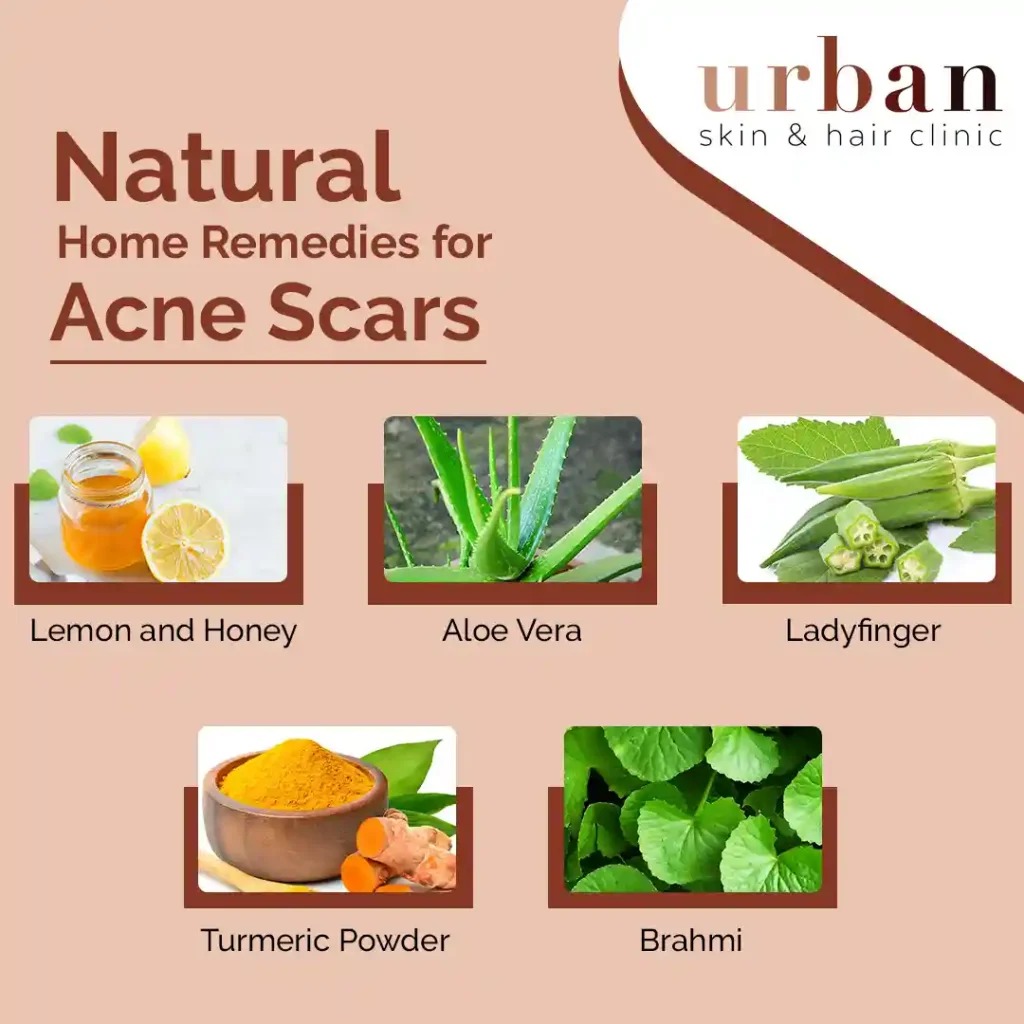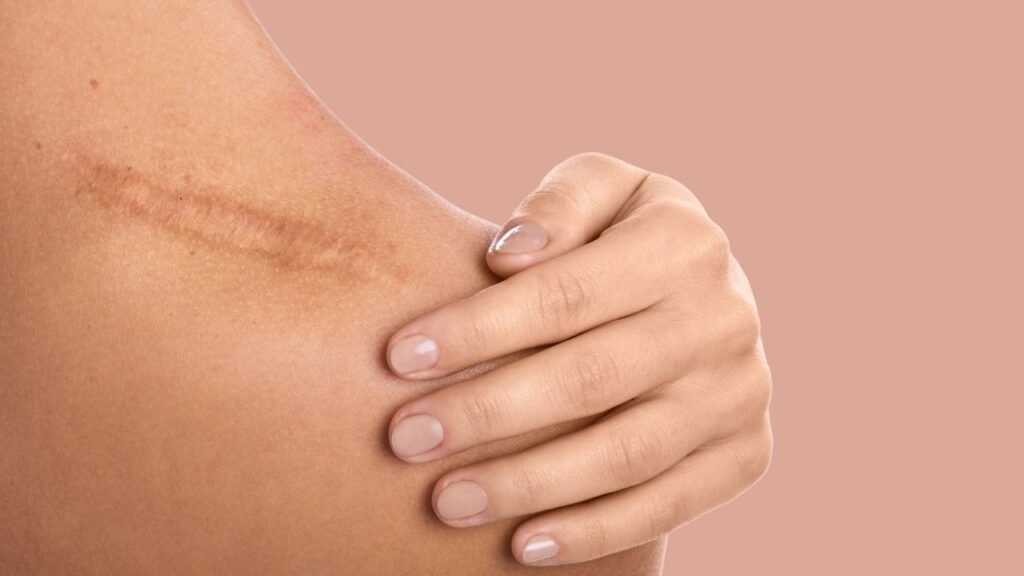How to get rid of Acne Scars (Advice by Dermatologist)

Table of Contents
We all have been through this: It’s the morning of a big date or an important meeting. You look in the mirror, and what do you see? A breakout! Pimples, zits, spots, outbreaks – it’s all acne.
Acne is a common problem that affects people of all ages. Acne is a chronic inflammatory disease of the skin that has several features but the main one is spots. Perhaps some people don’t label their problem as acne because they don’t think it’s bad enough, but it doesn’t have to be severe to be called acne.
Acne occurs when glands in the skin produce and secrete too much of the skin’s natural oil called sebum. The natural oil along with dead skin cells can clog pores, resulting in acne. And sometimes, bacteria called Cutibacterium acnes (C. acnes) gets into pores causing inflamed acne. About 85 percent of teenagers will eventually get acne.
Acne scars can affect your self-esteem which might cause psychological distress and interfere with your social life.
Scares are very common, and you should not be ashamed of them. The good news is these scars can be treated with time, dedication, and the right treatment. In this article, we have put together information that will make it easier for you to understand more about acne scars and how you can treat them. But before that you need to understand what they are.
Call Our Specialist
Our Clinic Locations
Understanding What is Acne Scars?
Acne scars are the result of breakouts caused by skin pores blocked with dead cells, excess oil, and bacteria. Blocking leads to swelling of the pores, which may cause breakage in the follicle wall.
This can create deep or shallow lesions that prominently appear on the skin. Your skin tries to repair these lesions by forming new collagen fibers. However, these repairs aren’t smooth compared to your original skin. Scars appear because your body tries to repair your acne.
This may leave a mark or pit behind. These scars are not genetic. But if your parents struggled with acne, you might too. This can ultimately lead to development of acne scars.
Types of Acne Scars
Acne scars can be Atrophic (caused by a loss of tissue) or Hypertrophic (caused by excess tissue)
Atrophic Scars
Such scars are shallow, flat depressions that usually heal below the top layer of the skin. These are further segregated into Ice pick scars, Boxcar scars and Rolling scars.
Ice Pick Scars
Ice pick scars are commonly noticed on the cheeks. They are deeper and more noticeable to the naked eye. These scars tend to be tough to treat. Home remedies may not work for these scars and it requires aggressive treatment.
Boxcar Scars
Boxcar scars are wider than ice pick scars. They look like round craters or box-like depressions with sharp edges giving the skin a pitted and uneven appearance.
These scars are caused by widespread acne or chickenpox They occur due to inflammatory breakouts that destroy the collagen. This leads to loss of tissue which creates depressions in the skin. Boxcar scars are common on the lower cheeks or jaws, where the skin is relatively thick.
Rolling Scars
Rolling scars are wide with rounded sloping edges. They make the skin look uneven and irregular. They are caused by fibrous bands of tissues that develop between the skin and internal tissue below. The bands pull the epidermis giving the skin a rolling appearance.
Hypertrophic Scars
Hypertrophic scars are equal to the size of acne that caused them. These scars appear as raised lumps of scar tissue. They are commonly noticed on the jawline, back, chest and shoulders. Those with darker skin color are more likely to develop these acne scars.
Post-Inflammatory Hyperpigmentation
You may notice a dark or discolored patch of skin after your acne heals. This is not a scar but post-inflammatory Hyperpigmentation that happens when your skin is damaged by severe acne or if you’ve picked or squeezed your acne. However, your skin will regain its natural color over time with a good sun protection routine.

Natural Home Remedies for Get Rid of Acne Scars
There’s no cure for acne, but treatments can get rid of breakouts and prevent new ones. The acne treatment that’s best for you depends on the severity of your acne. A good skin-care regimen is often the first line of defense for mild acne or the occasional pimple. But sometimes, treatment is needed to keep skin healthy. Here we will see some natural home remedies for acne scars.
Lemon and Honey
Lemon and honey together can work great for your skin. Lemon is acidic in nature and contains antibacterial qualities. This may relieve your skin of excess oil and fight bacteria.
Honey is a good antiseptic for your skin and body. It contributes to your body’s healing process and helps reduce scars faster. It is also a great way to naturally moisturize your skin and prevent it from producing too much sebum.
While lemon may not suit everybody’s skin due to its acidic qualities. Conduct a patch test before you apply it on your face.
Aloe Vera
Aloe vera helps regulate the production of melanin. It is a substance in your body that produces hair, eye, and skin pigmentation. The more melanin you produce, the darker your eyes, hair and skin will be. This helps reduce pigmentation and discoloration.
Ladyfinger
Ladyfinger is rich in vitamin A and vitamin C and has various antioxidants. It has beneficial effects on acne scars and acne and reduces skin irritation.
Turmeric Powder
The anti-inflammatory properties of turmeric help fight acne and prevent scarring.
Brahmi
Take a few leaves of Brahmi, mash them, and mix with some turmeric and lemon juice. This paste can be applied to the face. It has the potential to remove scars and acne.

Recent Posts

Your Ultimate Guide to Carbon Peel Treatments! What is a Carbon Peel? A carbon peel, also known as a Hollywood

Acne Treatment for oil skin
Myths About Female Hair Loss (Debunked) Medically reviewed by Dr. Kiran Table of Contents If you are suffering from recurring

How to remove unwanted facial Hair
How to remove unwanted facial Hair effectively? Medically reviewed by Dr. Kiran Table of Contents It can be common concern

How thyroid causes melasma
Medically reviewed by Dr. Kiran Table of Contents Are you tired of the skin pigmentation condition known as melasma, the

Myths About Female Hair Loss (Debunked)
Myths About Female Hair Loss (Debunked) Medically reviewed by Dr. Kiran Table of Contents Hair loss is very common concern

How much Botox treatment cost in India
How much does Botox treatment cost in India? Medically reviewed by Dr. Kiran Table of Contents A famous quote by

How much does scar removal cost in India?
How much does scar removal cost in India? Medically reviewed by Dr. Kiran Table of Contents The desire to look
Call Our Specialist
Our Process - To Get Rid of Acne & Pimple Scars
Acne scars on the face, chest and back are very common. Reducing the scars requires treatment either over-the-counter medications or one or more procedures performed by a dermatologist. The best procedures are given below:
Chemical Peeling:
Chemical peels reduce discoloration and scarring. They prevent breakouts and smoothen the skin. These peels work by removing the top layer of the skin and are a great way to rejuvenate the skin. This is a good option for people having shallow scars. This procedure usually doesn’t work well for those with deep scars. One should try a couple of peels before determining which one works better for you.
Chemical Peeling
One of the most preferred and popular methods used to remove acne scars by dermatologists. This process uses focused light therapy and doesn’t involve any chemicals. It helps to reduce the appearance of scars by removing the uppermost layer of the skin thereby revealing younger skin cells. It may not be suitable for those with sensitive skin.
- Number of things to keep in mind before getting laser treatment:
- Requires a board-certified dermatologist to conduct the treatment.
- At times sedation is required, depending on the depth of your scars.
Dermal Fillers
Dermatologists may recommend using soft tissue fillers to reduce the appearance of scars. These fillers may either be ones that consist of a collagen-based product or other commercial fillers like polymethylmethacrylate (PMMA), hyaluronic acid (HA) and poly-L-lactic acid (PLLA).
Micro needling
Micro needling is highly beneficial to reduce scars, wrinkles, stretch marks and discoloration. The medical process involves inserting tiny micro-needles around scars. This stimulates the body to produce more collagen. It is said to work best for depressed acne scars instead of the raised ones. This treatment may take up to 9 months to see changes. The effects of micro-needling on acne scars work better when the treatments are combined with Vitamin C.
Injections
Hypertrophic scars can be treated with corticosteroid injections. A few medications can be injected into raised scars to soften and flatten them. The process is conducted once every few weeks. Your dermatologist may combine these with other treatments.
Post-Treatment Skincare Tips
- Keep your skin clean and moisturized.
- Sun avoidance/Sunscreen.
- Avoid make-up post treatment.
- Applying skincare activities as per the doctor’s advice.
- Avoid picking at the skin after treatment.
Conclusion : How to Get Rid of Acne Scars
Consult an acne scar doctor for the proper acne scar treatment care advice. Doctors will provide you with ample information on how you can best prepare your skin for a smooth and successful treatment. An expert can provide a more complete understanding of pre- and post-treatment care for acne scar treatments. They will guide you according to your skin type and problem. They might also prepare you a healthy diet which can reduce further breakouts.
Acne most definitely has a negative impact on self-esteem. The face is the part of your body that everyone sees, so it’s only natural that people are self-conscious about deep acne scars. Research shows that scarring can have a negative impact on one’s self-confidence regardless of where it came from – a burn, a genetic condition or acne. With lower self-esteem, individuals with scarring are less likely to feel relaxed and attend social events.
In today’s technologically advanced world, treating acne scars has become an easy task. Fortunately, there are treatments to help minimize the appearance of scars. However, the first step remains to treat the acne that causes them. Your dermatologist can suggest the best treatment based on your skin type and severity of scarring.
Always follow a skincare regimen and maintain skin hygiene to avoid future outbreaks.
Our Expert Doctors








